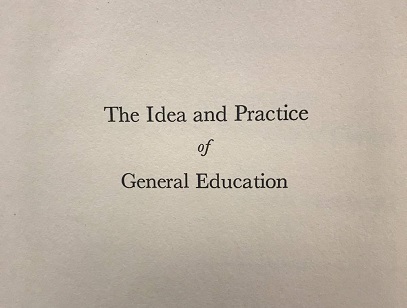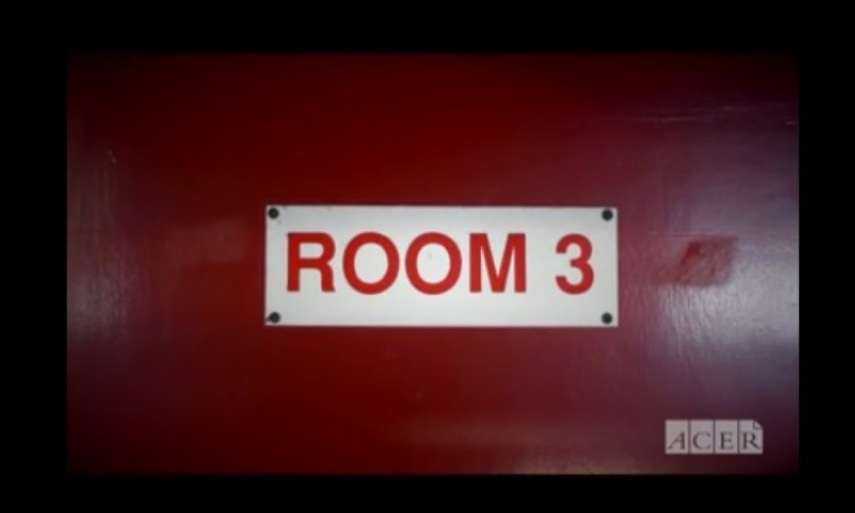Once a fortnight the Teacher team ventures down to Room 3 – the basement archives at the Australian Council for Educational Research.
Home to a plethora of texts originating from way back when, we bring you choice titbits from some of our favourite historical titles via Facebook and Twitter.
If you happened to have missed some of our Room 3 gems, here's a recap of what's recently been posted online (you can also click on the links at the bottom of this article to explore Volume 1, 2 and 3):
Ward, F. Champion. The idea and practice of general education. University of Chicago Press, 1950.

‘One of our basic needs as a nation is a generally educated citizenry, for the success of our democracy depends ultimately upon the wisdom of our people.' (1950)
‘General education must undertake, therefore, to prepare people to think profitably for themselves.' (1950)
‘No man is unaffected by the patterns of the society he lives in, least of all students in an educational institution.' (1950)
‘The classroom becomes a place where teacher and student together explore whatever there is to be known.' (1950)
‘The whole art of teaching may almost be defined in terms of the power to make minds really active and to make them act on reality.' (1950)
‘Each time the mind reaches out to grasp knowledge, it becomes a little surer in its technique of grasping…' (1950)
Partridge, E. H. (1943). Freedom in education: the function of the public boarding school. Faber & Faber.
‘The function of a public boarding school is the education of the whole [child].' (1943)
‘[Education] amounts to more than independence of mind, and, for that matter, true independence of mind has a physical basis.' (1943)
‘The first essential is to be perfectly clear that scholarship at its best is not a filling of the mind…' (1943)
‘Certainly you cannot know a [child] thoroughly until you have taught or attempted to teach them something.' (1943)
‘This need for adequate preparation of lessons cannot be overemphasized, particularly with beginners…' (1943)
‘Teachers must remember that if they expect good work they must spare no pains on it themselves…' (1943)
Pedley, R. (1956). Comprehensive education: a new approach. V. Gollancz.
‘The shortage in schools of teachers of science and mathematics – especially of highly qualified teachers – is extremely serious.'(1956)
‘A system of education cannot by itself put society to rights.' (1956)
‘Children are marvellously adaptable: they can grow up conditioned to a career on the farm, in the factory, or in the office, and get by. But such predetermination is foreign to all that we understand by a liberal education. (1956)
‘We must cast the net very wide indeed to make sure of getting the really able and deserving people, and then wait for them to emerge as they go up the school.' (1956)
‘Too many other urgent demands are made of our slender staffing resources to justify extravagance anywhere.' (1956)
James, E. J. F., & James, B. (1951). Education and leadership (Vol. 26). London: Harrap.
‘It has been said that the good leader in any field must be a person of high intelligence.' (1951)
‘The able child is quick to realize the irrelevance of much that is now imposed in the name of general culture, and in its pursuit he is at best bored, at worst frustrated.' (1951)
‘A university must recruit most diverse kinds of people for a wide variety of future careers.' (1951)
‘If a school is to be a true community, it must contain children of varying intellectual qualities.' (1951)
‘It is necessary for the obvious reason that the progress of society in every field, not least in education itself, may reasonably be held to depend on the qualities of those who guide it.' (1951)
‘Our task, then, is to consider those attributes which are characteristic of the best kind of leadership, and to discuss the education best calculated to develop them.' (1951)
Unesco. (1951). Freedom and culture. London: Wingate
‘Education is thus not simply a mere forming, but a necessary formative condition of natural development itself.' (1951)
‘To proclaim the right to everyone to education thus involves a much greater responsibility than merely to teach each child the three R's.' (1951)
‘First of all, parents are only human. Some of them are excellent, but others are less so, and it is often necessary to protect the children against their desires.' (1951)
‘Most educational innovators have suffered the same experience. They have found that parents are often the chief obstacle to the introduction of more advanced methods of education.' (1951)
‘Do we want to produce individuals subject to the constraint of tradition and the outlook of previous generations?' (1951)
Berkson, Isaac Baer. Education Faces the Future. Harper, 1943.
‘The fact that society is changing is all the more reason to emphasize the conservation of the well-established values.' (1943)
‘Lifelike problems will constitute the curriculum material, rather than the conventional school subjects.' (1943)
'Genuine learning situations are marked by the presence of inter-related interest and effort, by undivided and sustained attention in a developing activity.' (1943)
‘The school's major task is to find activities which are not, on the one hand, too easy or, on the other, too difficult, which stimulate instead of discourage or dull interest.' (1943)
‘Language is of such great importance in education because it is the means of exchange of experiences, of making co-operation possible, of sharing with others, with the present group and with past generations.' (1943)
‘Provision of a learning environment rich in possibilities and vigorous in stimulating power is essential.' (1943)
‘One of the difficult problems in using education as a means for eliminating prejudice arises out of the fact that some of our leading educational institutions are offenders in this matter.' (1943)
Giles, G. R. & Boys' Employment Movement. (1935). Careers for boys and girls. Melbourne : Robertson & Mullens
'The first thing to remember, when talking about the “goodness” of schools, is that every school is a “good” school, but every school is not a “good” school for every boy or girl. The “goodness” depends on the pupil as well as on the school.' (1935)
'The important decision to make is not what is a good school, but what is a good school for the child, and that depends on his abilities and your plans for the future.' (1935)
'What information does one need before decision on a career? To give my full answer to this question would take a very long time, but I may sum it up in a few words: “Know thyself” and “Know occupations”. By knowing your abilities and your weaknesses, you can build up one side of the picture, and by knowing occupations you are enabled to say where your particular combination of talents and capacities can be put to best use.' (1935)
‘Many people never find the business or the career they like, because they want other people to do all the hunting. Keep on trying and trying, with a definite plan in your mind.' (1935)
'It should be remembered that a vocation must not be recommended on the basis of intelligence alone.' (1935)
‘Do not think that ever subject is not of value. All are valuable to every pupil, but you have to choose the most valuable for your purpose.' (1935)
‘The actual finding of the right career is spread over a number of years.' (1935)
Rankin, D. H. (1941). The philosophy of Australian education. Melbourne, Thje Arrow Printery PTY LTD.
‘The philosopher should lead the educator, but the educator can also set the philosopher aright.' (1941)
‘The philosophy of education investigates the fundamental problems of philosophy in the light of education, and the fundamental problems of education in light of philosophy.' (1941)
‘The ideal of life always goes hand-in-hand with the ideal of education.' (1941)
‘The great battles of education are not waged in the field of pedagogy, but in the fields of philosophy.' (1941)
‘In human society there is nothing more worthy of praise, nothing greater, nothing more influential than the work of the teacher, and Australian teachers are aware that they have a rich and unbounded field of investigation.' (1941)
Woodhead E.W., Birchenough C. & Stephenson F. (1948) Partnership in Education, Education Handbook No. 3. Norwich: Jarrold & Sons Ltd.
‘Education must continue to develop the individual but must relate this purpose to the needs of the community.' (1948)
‘It is amazing to find how many schools are happy, friendly and progressive against all odds…' (1948)
‘Every effort should be put forth to make a real contact between the world of education and the community of which it is a part.' (1948)
‘The condition and welfare of an individual school is … a matter of national as well as local concern.' (1948)
Education for citizenship in secondary schools. (1936) (1st ed.). London. Oxford University Press.
‘We believe that the first great step towards such a democracy lies in giving far more conscious attention throughout our educational system to the problems of the best methods of educating citizens.' (1936)
‘If we wish to train good citizens of democracy it is essential that one of the conscious and deliberate aims of their teachers should be to interest their pupils in the affairs of the modern world and so to train them that they will later develop a power of wise social judgement.' (1936)
‘To eliminate all bias from his teaching would be to eliminate all personality and life…' (1936)
‘…No amount of intellectual training will in itself create good citizens.' (1936)
‘There are few schools which do not consciously strive so to develop the character of their pupils that the individual may be worthy of freedom and capable of self-control.' (1936)
‘No members of a great profession have heavier responsibilities or a nobler chance of service to mankind than the teachers of history.' (1936)
‘Let us aid and encourage the instructors of our schools to rise to the height of their noble calling.' (1936)

